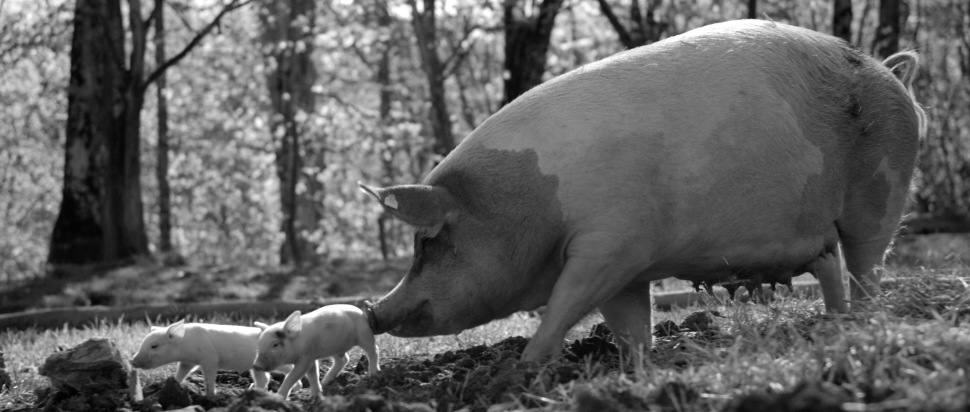Victor Kossakovsky on Gunda
The star of the latest documentary from Russian director Victor Kossakovsky is a giant pig named Gunda. He hopes that you look on her and her offspring with respect and compassion, and not just wonder what she'll taste like with apple sauce
If you’re going to make a movie about a pig, there are a few ground rules to follow. Your porcine protagonist should be cute, it should talk, and it should have some sort of adventure – think of Babe (1995) and its sequel Pig in the City, the 2006 adaptation of Charlotte’s Web or Hayao Miyazaki’s fighter pilot in Porco Rosso (1992). That’s the received wisdom, at least. Without a few anthropomorphising touches and an injection of drama, it’s hard to imagine many producers lining up to back a film about a pig that’s content to be a pig.
Enter Gunda, the titular sow in Victor Kossakovsky’s new film. Over the course of Gunda’s 93 minutes, we see this animal give birth, feed her young piglets, stroll around the farmlands, shelter from the rain and wallow happily in some mud. The soundtrack consists of nothing more than the grunts and squeals emitted by Gunda and her offspring, or the moos and clucks of the cows and chickens that Kossakovsky occasionally cuts away to. Gunda simply invites us to spend time contemplating these animals and – the director hopes – to see them as something other than a source of food.
“This is something I don't understand. In the UK you have a lot of pets, right?” the personable and voluble Russian director asks over Zoom. “We love dogs because they understand us, because they love us, because they are our best friend. But why is it so difficult for us to make the link that the animals we eat have the same abilities? They have an inner life. Why is it so difficult to understand?”
A committed vegetarian since he was four years old – when he realised a pig he loved had ended up on the family’s dinner table – Kossakovsky is passionate about animals and deeply frustrated by the way the human race treats them. During our conversation, he is prone to reeling off facts and figures detailing the extraordinary number of animals killed every year, but Gunda is no strident propaganda piece. There is no footage of slaughterhouses to shock us into repentance. Instead, Kossakovsky lets the camera rest on his subjects’ faces and allows us the time and space to connect with them, to see their personalities and emotions emerge.
Gunda was filmed on farms and sanctuaries around Europe and the UK where animals are allowed to live longer than normal. “This is why my cows are beautiful: because they are grandmothers,” he explains. “They are over 20 years old, which normally you would never see. That's why you look at their faces and, just like a normal old person, you see life behind them.”
This desire to focus our attention on the animals themselves dictated his decision to shoot Gunda in black-and-white, to avoid any risk of viewers being distracted by the bucolic surroundings. “Pigs have very little eyes, so you would mostly just see pink pigs, green grass and blue sky, but when you see black-and-white you immediately see Gunda's eyes, right? She is talking to you, especially at the end when she came to the camera. You could not miss what she said to you. She said, ‘What the hell are you doing?’”
What are we doing? In Kossakovsky’s view, by destroying animals we are ultimately destroying ourselves. “We have to eliminate the act of killing from our behaviour if we are to grow as a civilisation. We don't have long nails and we don't have long teeth to kill. There is no sign that we are predators, but we decided to be predators.” He doesn’t sound particularly confident about humanity at large changing its ways, but he does think the COVID-19 pandemic should be regarded as a wake-up call.
“The virus lived here much longer than us,” he says. “It was sleeping but we were able to wake it up. We are dominating, dominating, dominating without even thinking of other creatures, and I always thought nature will not take us any longer. One day nature will say 'No!' to these bastards who destroy everything. When you go out to the forest you say, ‘Ah, it's beautiful,’ but that’s because there are no people around to destroy it.”
In fact, the lack of a human presence in Gunda – except for a critical instance towards the end – is one of its most notable aspects, and Kossakovsky will take any opportunity to challenge our fixed notions about human supremacy over all the other creatures with whom we share this planet. “We are proud of the internet, but whales communicate over thousands of miles. We are proud of having GPS, but birds are flying from Russia to Africa with no technology. How are they doing it? Everything we have we learned from animals – we have helicopters because Leonardo was looking at butterflies.”
Kossakovsky sits back and wearily shakes his head at the folly of it all. “You see the hypocrisy? We cannot live without them, and yet we just don't respect them at all.”
Gunda is released on 4 Jun by Altitude
